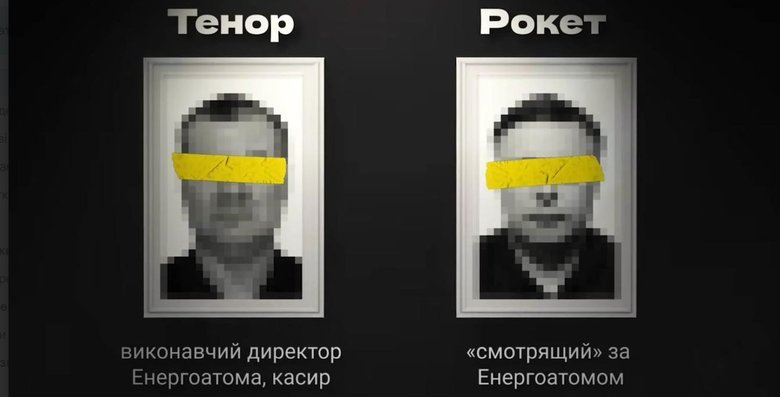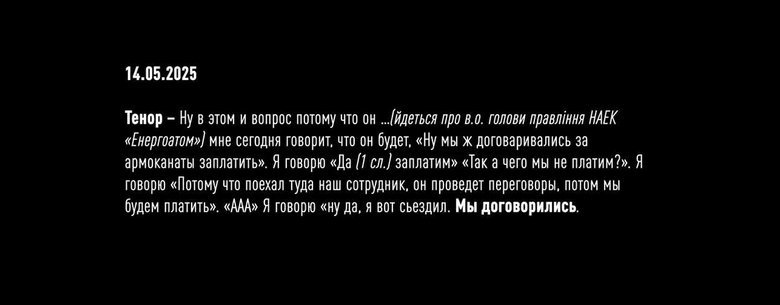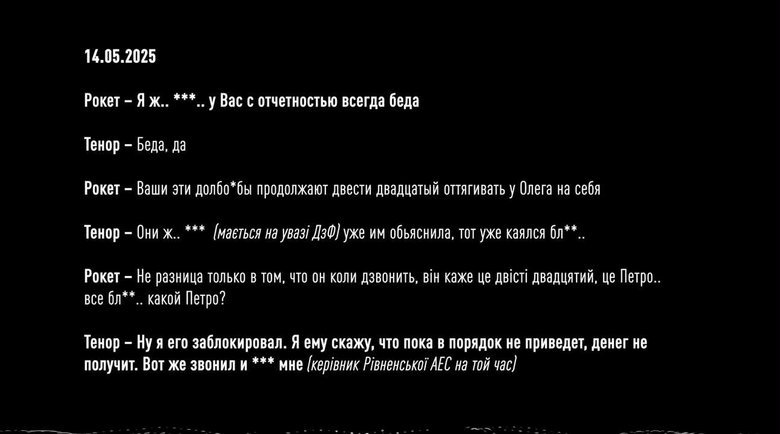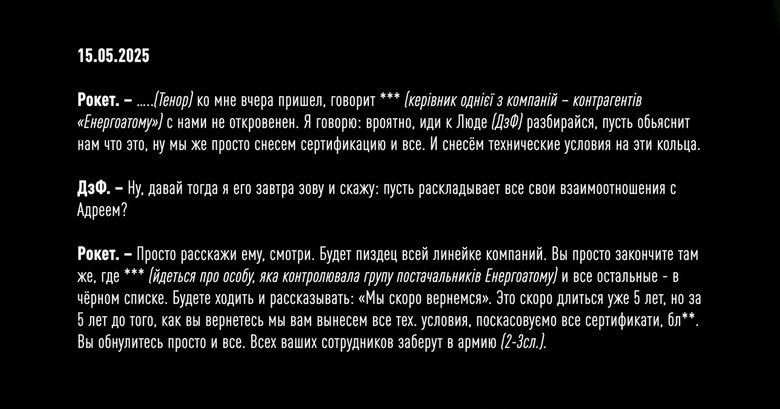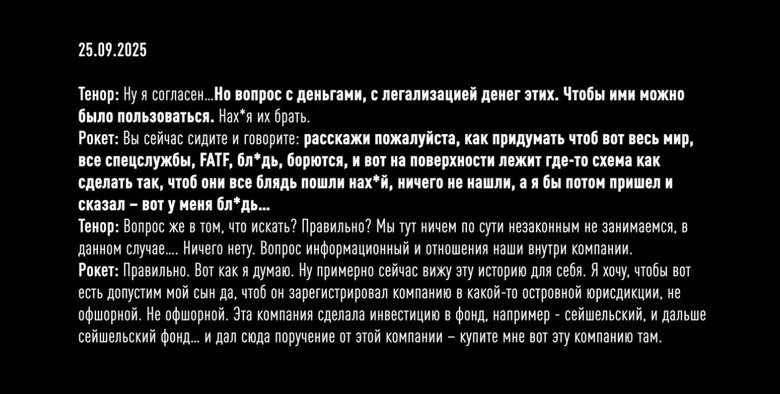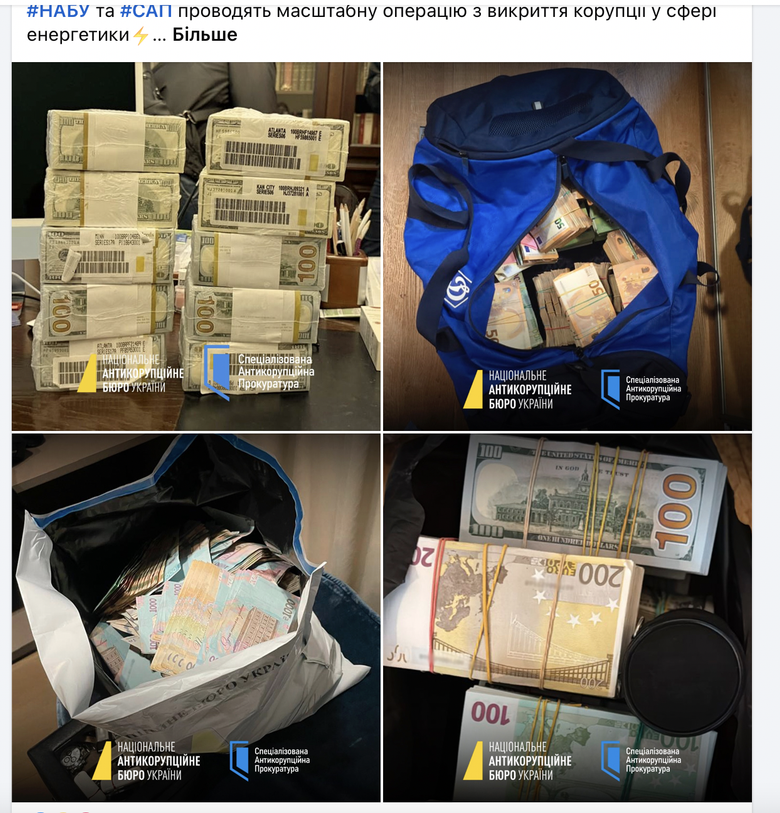Operation "Midas": how Halushchenko’s adviser and Energoatom’s "overseer" embezzled millions from state and who will now catch "Karlson" Mindich
On 10 November, officers of the National Anti-Corruption Bureau of Ukraine (NABU) carried out a large-scale operation to uncover corruption in the energy sector. It was underpinned by 15 months of work, 1,000 hours of audio recordings, and 70 searches.
"The activities of a high-level criminal organization have been documented. Its members built a large-scale corruption scheme to exert influence over strategic state-sector enterprises, including JSC NNEGC ‘Energoatom’," the press release on NABU’s website states.
Ukrainians once again saw bags of dollars, hryvnias and euros earned from energy-sector kickbacks, which in effect led to inadequate protection of nuclear generation facilities.
In fact, this story is not only about kickbacks at Energoatom, but about corruption that may involve former Energy Minister Herman Halushchenko, his then-deputy and now minister Svitlana Hrynchuk, and figures close to the president, notably Timur Mindich.
But first, the scheme.
Either you pay a kickback, or your payments get blocked
The main figures on the NABU recordings released so far are "Rocket" (the "overseer" for Energoatom) and "Tenor" (Energoatom’s executive director). According to media reports, they are Ihor Myroniuk ("Rocket") and Dmytro Basov ("Tenor").
Ihor Myroniuk was mentioned in the media as an adviser to Herman Halushchenko as early as 2023. According to Nashi Hroshi (Our Money -ed.), Myroniuk served as an aide to MP Andrii Derkach from 2002 to 2012 and, under Yanukovych, became a deputy head of the State Property Fund. Myroniuk’s son, Artur, in recent years worked in Energoatom’s Technical Assistance Project Coordination Department, handling projects involving Ukraine’s international donors.
Dmytro Basov is the former head of the Prosecutor General’s Office department for investigating crimes committed by criminal organizations. In 2019, he was dismissed from his post, reportedly over a series of corruption scandals, according to media reports. He later succeeded in challenging the decision in court and won reinstatement and compensation of over UAH 2.5 million in back pay for the period of alleged enforced absence.
In the audio released by NABU, the scheme’s participants discuss kickbacks they could obtain from Energoatom’s contracting companies.
"The established practice at Energoatom allowed post-payment for services of up to six months. A company could obtain the right to supply only after undergoing an assessment and being granted supplier status. Meanwhile, under an order by the Ministry of Strategic Industries, Energoatom was included in the list of enterprises from which, during martial law, debts may not be recovered through court-enforced collection. Exploiting this and broad discretionary powers, a so-called ‘barrier’ scheme was introduced at the company: either you pay a kickback, or your payments for already-performed work are blocked and you are stripped of your approved Energoatom supplier status," explained Oleksandr Abakumov, head of the Detectives Department.
In conversations between "Rocket" and "Tenor," they discuss the mechanism for pressuring counterparties, which created the conditions for obtaining undue advantage.
Moreover, the two figures in the case could alter the fate of payments contrary to the position of Energoatom’s management.
"Part of the undue gain was to be collected by the heads of nuclear power plants and passed to Tenor as a condition for allocating funds for the NPPs’ current expenses," Abakumov noted.
The methods of "discipline" and extortion took the form of threats to destroy the company and have all its employees mobilized.
Rocket: Just tell him: look, it’s going to be a f**ing disaster for the entire line of companies. You’ll end up where the (person who previously controlled Energoatom’s suppliers) did, and everyone else will be blacklisted. Then you’ll be going around saying, "We’ll be back soon." It’s already been five years, and in those five years before you "come back," we’ll have all your technical specifications thrown out and all your certificates canceled. You’ll be wiped out, period. All your employees will be drafted into the army.
One of the most cynical exchanges was recorded in early July, where the two figures discuss how to keep making money on shelter facilities.
Tenor: Right, I wanted to talk to you about these construction projects. About (1 word) and other things. They’re planning to keep building f*ing protective structures; the numbers are insane. Are we going to do anything else, or stop with what we’ve got? And we won’t be building protective structures anymore?
Rocket: I’d wait. But f*ck, honestly, it’s a waste of money, throwing it away.
Tenor: The only question, if we’re to protect the company’s interests, is to build it ourselves.
Rocket: But we don’t have a company, Cyprus has dropped out.
Tenor: No, there’s one. One.
After Rocket and Tenor received the money, they discussed at length how to launder the funds. In short, the idea was to have a chain of "island" companies (Cyprus, the Seychelles, Mauritius, the Caymans) through which the money would flow to obscure the trail. A Mauritius-level vehicle, that’s the kind a prime minister uses.
At the same time, Rocket ponders how to leverage family assets, say, his wife’s apartment in Obolon, to present the scheme as funded with his own legitimate money.
Tenor: Well, I agree... But the question is about the money, about legalising this money. So that it can be used. Why the f*ck take it?
Rocket: You’re sitting here saying: please explain how to set it up so that the whole world, all the security services, FATF, f#ck, who are fighting, while the scheme is lying right in plain sight somewhere, would all just go f#ck themselves, find nothing, and then I could show up and say, "Here I have, f#ck…
Tenor: The question is what there is to look for, right? We’re not doing anything essentially illegal here, in this case… There’s nothing. It’s about information and our internal relationships within the company.
Rocket: Exactly. Here’s how I think about it. Roughly, this is how I see it for myself now. I want, here we have, let's say that, my son to register a company in some island jurisdiction, not an offshore one. Not offshore. That company would invest in a fund, for example, a Seychelles fund and then the Seychelles fund… would issue a mandate here on behalf of that company: buy me that company over there.
So far, all this money has been laundered through an office in central Kyiv belonging to the family of traitor Andrii Derkach, a former MP, a subject of an SSU (Security Service of Ukraine -ed.) investigation, and now a senator of the Russian Federation.
It was in this office. headed by a certain Roshyk, that a "black ledger" was kept, cash was stored, and all payments were recorded. From there, the money was literally carried in bags and delivered to clients.
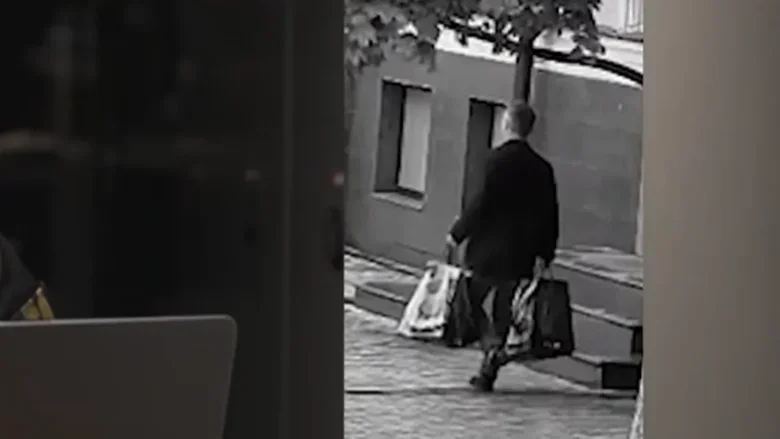
The money-siphoning schemes involved not only the United States (hence the "Kansas" and "Atlanta" markings on the bundles of banknotes) but also routes via Moscow.
Notably, journalists from Bihus.Info reported that after Dmytro Basov was appointed executive director for physical protection and security at JSC NNEGC "Energoatom," his family became significantly wealthier. According to property-registry data, in 2024, the official’s wife acquired a 70-square-meter apartment in one of Kyiv’s most expensive residential complexes—White Lines.
"In addition, over the past two years, Nataliia Basova has substantially updated her car collection—adding a 2023 Mercedes GLE 300d, a 2019 Range Rover, and a new 2025 Mercedes GLC 220d registered to her in October this year. The estimated value of Nataliia Basova’s purchases in recent years is around $360,000," the investigation notes.
What NABU released on Monday is only part of the story.
The next tranche will be released on Tuesday after 1:00 p.m., and, according to MP Yaroslav Zhelezniak, may already include recordings featuring Tymur Mindich directly
According to Ukrainska Pravda’s materials, NABU conducted searches at Mindich’s residence (searches were also carried out at the Ministry of Justice, which is currently headed by Herman Halushchenko). However, Mindich "very unexpectedly" left the country on the very day of the searches.
UP reports that the leak to Mindich may have come from Andrii Syniuk, deputy head of the Specialized Anti-Corruption Prosecutor’s Office (SAPO).
Two years ago, Censor.NET already covered the Supreme Court judges case, in which Syniuk may have been involved in a leak, citing information about his questionable meetings with figures in the case. At the time, this information did not receive proper publicity, and the head of the agency chose to act as though the leak was not coming from them.
MP Yaroslav Zhelezniak, citing his own sources, now writes that Syniuk may also face a notice of suspicion.
At the same time, Oleksandr Abakumov, head of a NABU detectives group, stated that in this case, the key figures have not yet been served with notices of suspicion. However, four ministers (not all currently in office) may turn out to be figures in the case.
For who Tymur Mindich is and how he became an influential figure in the energy sector, see Censor.NET’s previous report.
Tetiana Nikolaienko, Censor.NET

